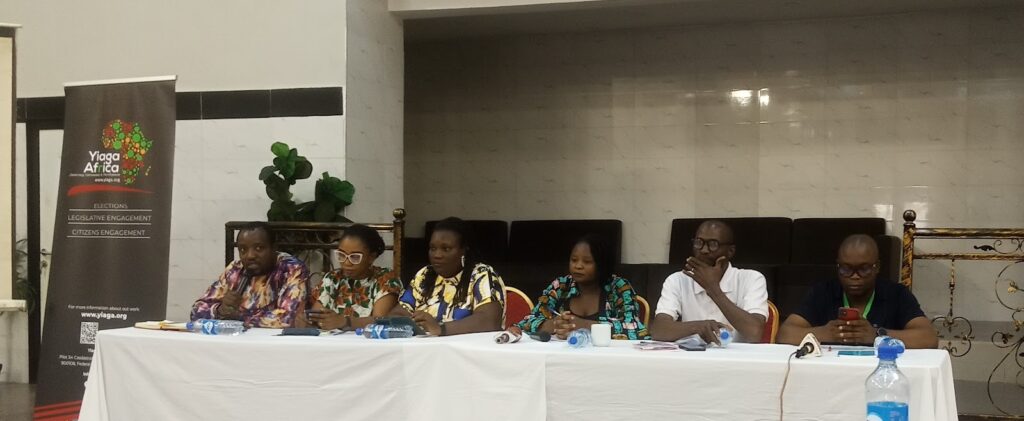
Discussants who gave feedback on their election experiences. From L-R: Dr. Bright Oniovokukor of Indomitable Youth Organization; Eromon Blessing of CLEEN Foundation (Benin); Annie Umoru of Initiative for gender equality and advancement; Safiya Bichi (coordinator of segment) of Yiaga Africa; Andy Egbon of NUJ and Rev. Fr. Benedict Onwugbenu of JDPC (Benin).
By Bernadette Idalu
Based on its independent monitoring of the last governorship election in Edo State, Yiaga has yet again reiterated its position that the election failed the integrity test based on identified lapses sourced through reliance on the “Process and results verification for transparency,” PRTV, template.
Samson Itodo, Executive Director Yiaga Africa who made above claims through a position paper co-signed by him and Dr. Aisha Abdullahi, Chair of the 2024 Edo Election Mission, based on its analysis of the election, stated, at the one day post election reflection meeting with civil society leaders, and media partners at the Viewpoint Hotel on Thursday, October 10, 2024, reiterated Yiaga’s deployment of the PRTV methodology, a process which involved the independent monitoring of polling units across the 18 Local Government Areas by 300 stationary and 25 roving observers through which logical challenges in the voting process such as delays in the commencement of accreditation and voting at various polling units across the state got identified.
Yiaga while acknowledging INEC’s application of its guidelines and uploading of results on the iRev portal, however, frowned at incidents of results manipulation and disruption during ward and local government collation at Ikpoba Okha, Etsako West, Egor and Oredo Local Government Areas, including intimidation of INEC officials, observers and party agents, in addition to the collation of results contrary to the provision of the Electoral Act and INEC guidelines which he said severely undermined the credibility of the election results.
The reflection meeting with civil society (CSO) leaders, and media partners was highly interactive. Participants aside making post election reviews of the election umpire – INEC, and its agents on the election field, also touched on roles played by political parties, security agents, inclusiveness of persons with disabilities, PWD, in the voting process, incidents of violence and intimidation of some persons associated with the electoral process, coercion/vote buying, voter apathy and the growing lack of trust in INEC by the electorate.
Participants noted that though the election was mostly peaceful, however, there was heightened tension. Rainfall on the election day they posited was partly responsible for the low voter turn out in Edo South.
Recommendations were made for electoral reforms and transparency based on reactions trailing the outcome of announced results by INEC by aggrieved key political players who insist on a recount of votes based on discrepancies which relate with the collation process.
Some of the reforms agitated for included the identification and prompt phasing out of multiple voter registrations; electronic voting system/iREV should be revisited; aspirants with less than 6months membership of said political party of choice prior to election should be barred from contesting to prevent cross carpeting to other political parties; use of BVAS, uploading of results into the iREV and announcement of results should be done on real time basis. A plea was raised that those accused of breaching security as well as those found complicit in the inducement of voters during the voting process be identified, shamed and punitive measures taken against such be made public.
A panel of discussants ventilated on their field experience and emerging election trends.
